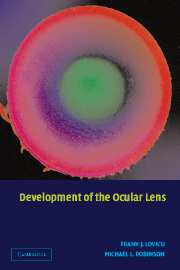Book contents
- Frontmatter
- Contents
- List of Contributors
- Preface
- Acknowledgments
- Part 1 Early Lens Development
- Part 2 The Lens
- Part 3 Lens Development and Growth
- 8 Lens Cell Proliferation: The Cell Cycle
- 9 Lens Fiber Differentiation
- 10 Role of Matrix and Cell Adhesion Molecules in Lens Differentiation
- 11 Growth Factors in Lens Development
- 12 Lens Regeneration
- Bibliography
- Index
10 - Role of Matrix and Cell Adhesion Molecules in Lens Differentiation
Published online by Cambridge University Press: 30 January 2010
- Frontmatter
- Contents
- List of Contributors
- Preface
- Acknowledgments
- Part 1 Early Lens Development
- Part 2 The Lens
- Part 3 Lens Development and Growth
- 8 Lens Cell Proliferation: The Cell Cycle
- 9 Lens Fiber Differentiation
- 10 Role of Matrix and Cell Adhesion Molecules in Lens Differentiation
- 11 Growth Factors in Lens Development
- 12 Lens Regeneration
- Bibliography
- Index
Summary
Epigenetic signals resulting from either cell-matrix or cell-cell interactions are critical to the regulation of cell differentiation and development. This is particularly true in the complex differentiation process that enables a lens epithelial cell to become a differentiated lens fiber cell and in the developmental events that direct a region of head ectoderm to invaginate, pinch off, and begin to form the lens. In this chapter we discuss the role of cell adhesion molecules in lens differentiation and development.
Extracellular Matrix
The molecular organization of the basement membrane can profoundly influence cellular behavior by providing information that can affect the genetic program of a cell. Its major components include proteins such as laminin, collagen type IV, fibronectin, and proteoglycans. These extracellular matrix (ECM) proteins direct differentiation-specific gene expression in most cell and tissue types (Bissell and Barcellos-Hoff, 1987; Bissell et al., 1982; Streuli et al., 1991). Their ability to orchestrate both cell differentiation and tissue development requires interaction with cell surface receptors (e.g., the integrins), by which they initiate specific intracellular signaling pathways (Giancotti and Ruoslahti, 1999). The expression and distribution of ECM proteins in the lens is well characterized, both throughout development and in the mature lens. The knowledge that has been gained, in combination with mutational and inhibitor studies, provides insight into the role of ECM molecules in the process of lens development.
Information
- Type
- Chapter
- Information
- Development of the Ocular Lens , pp. 245 - 260Publisher: Cambridge University PressPrint publication year: 2004
Accessibility standard: Unknown
Why this information is here
This section outlines the accessibility features of this content - including support for screen readers, full keyboard navigation and high-contrast display options. This may not be relevant for you.Accessibility Information
- 2
- Cited by
